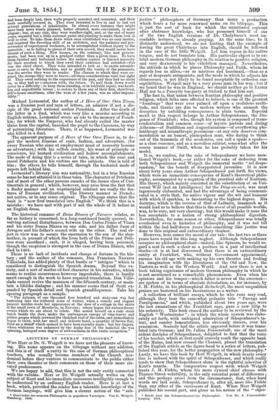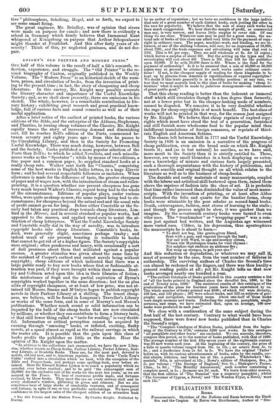LECTURES ON GERMAN PHILOSOPHY. *
Wito Herr or Dr. G. Weigelt is we have not the pleasure of know- ing. His name appears on the titlepage without any addition, and this is of itself a rarity in the case of German philosophical teachers, who usually become members of the Church Aca- demical before they venture to communicate to the public either their own theories or their comments on those of their more ele- vated predecessors. We are happy to add, that this is not the only rarity connected with the volume. Herr or Dr. Weigelt actually writes on the subject of Kant and his immediate successors intelligibly enough to be understood by an ordinary English reader. Here is at last a book, which, provided the reader has a tolerable knowledge of the German language, will give him a clearer notion of the " sub-
• Geschichte der neueren Philosophic in popularen Vortrigen. Von G. Weigelt. Hamburg. 1851.
jective" philosophers of Germany than many a production which bears a far more renowned name .on its titlepage. This is just the sort of book for which the uninitiated aspirant after abstruser knowledge, who has possessed himself of one of the two English versions of Dr. Chalybteus's most un- readable lectures, is already gasping. At the same time, be it distinctly understood, we are not hinting that the • example .of forcing the great Chalvbteus into English, should be followed in the case of the little Weigelt. Let him repose in his native tongue, and do not translate him. His particular object is to ex- hibit modern German philosophy in its relation to positive religion, and very dexterously is his exhibition managed. Nevertheless, the attitude in which he places Philosophy and Faith, whom he regards less as allies,—or as mistress and handmaid,—than as a pair of desperate antagonists, and the mode in which he adjusts his chiaroscuro, is not likely to be found acceptable by orthodox sus- ceptibilities. Weigelt may be a very pious man in his way ; but if we heard that he was in England, we should neither go to Exeter Hall nor to a Puseyite tea-party at Oxford to find him out. The fact is, that union between Kantian philosophy and positive religion, which folks once affected to believe, is one of the greatest " humbugs " that were ever palmed off upon a credulous multi- tude, and thanks are due to modern writers who unmask the deception by unfolding consequences in plain terms. Especial merit in this respect belongs to Arthur Schopenhauer, the Dio- genes of Frankfort; who, though his system is composed of trans- cendentalism and common sense—of mystic pietism and daring Atheism—of Buddhism and Augustinianism—of overflowing phi- lanthropy and misanthropic pessimism—at any rate deserves com- mendation as an honest, plainspoken man, who daring to think out of the trammels of the academies, can call a spade a spade— as a close reasoner, and as a merciless satirist, somewhat after the coarse manner of Swift, whom he has probably taken for his model.
It is, we confess, for the sake of Schopenhauer we have men- tioned Weigelt's book,—or rather for the sake of deducing from both Schopenhauer and Weigelt the immortal motto "nil despe- randum," for the benefit of disappointed juveniles. It is now about forty years since Arthur Schopenhauer put forth his views, which were an immediate consequence of Kant's theoretical philo- sophy, accompanied by a negation of the practical side of Kantism. His theory, which mainly consisted in the substitution of an Uni- versal Will (not an Intelligence) for the Ding-an-sick, was most ingeniously elaborated, and had the advantage of being communi- cated in a style that, for native vigour and the wit and humour with which it sparkles, is fascinating to the highest degree. His doctrine, which is the reverse of that of Leibnitz, inasmuch as it would lead us to believe that this is the worst of all possible worlds, was, to be sure, not very cheering ; but this would make it none the less acceptable to a nation of strong philosophical digestion. Nevertheless, for some reason or other, Schopenhauer was totally overlooked even in histories of philosophy, and it was not till within the last half-dozen years that something like justice was done to this original and extraordinary thinker. However, here comes the moral of our tale : the last two or three years have repaid for this long neglect. Although Schopenhauer occupies no philosophical chair—indeed, like Spinoza, he would re- gard a seat in such a chair as a position in a pair of intellectual stocks—it is at last discovered that there is an extraordinary entity at Frankfort, who, without Government appointment, amuses his old age with making up his own theories and feeding his imagination with the literatures of the Old and New, the Eastern as well as the Western World. And now there is not a book taking cognizance of modern German philosophy in which he is not mentioned as a remarkable phenomenon. Even when his opinions and his temper—which latter is never of the sweetest— are spoken of in terms of absolute detestation, as, for instance, by J. H. Fichte, in his philosophical Zeitschrift, the most unqualified praises are bestowed on his fascinations as a writer.
A collection of brilliant essays, which he who runs may read, although they bear the somewhat pedantic title " Parerga and Paralipomena," and which, published about two years ago, were the last emanations of the Frankfort sage, gave a new fillip to his notoriety. This book caused the author to be reviewed by the English " Westminster " ; in which the whole system was elabo- rately set forth, with unfeigned admiration of Schopenhauer's ta- lent, and sundry lamentations, less obviously sincere, over his pessimism. Scarcely had the article appeared before it was trans- lated into German; and Dr. Julius Frauenstadt, one of the most ardent disciples of Schopenhauer, delighted to find that the voice of his teacher, which at first could scarcely reach the opposite bank of the Maine, had now crossed the Channel, placed the translation of the English article as the figure-head to a series of letters, pub- lished this year, for the better propagation of the new philosophy.* Lastly, we have this book by Herr Weigelt, in which nearly every line is imbued with the spirit of Schopenhauer, and which really tends to show that Schopenhauer alone is the rightful inheritor of Kant's mantle. The comparative respect with which Weigelt treats J. H. Fichte, whom his more cynical chief abuses with Thames Street volubility, is the only essential point of difference ; and this perhaps arises from the circumstance, that, when hard words are laid aside, Schopenhauer is, after all, more like Fichte than any other of the successors of Kant. When Herr Weigelt publishes his second part, and gives us his notion of the " objec-
• Briefe iiber die Sehopenhauers'che Philosophic. Von Dr. T. Frauenstildt• Leipzig. 1854.
tive " philosophers, Schelling, Hegel, and so forth, we expect to see some smart firing. The great engineer, Mr. Brindley, was of opinion that rivers were made on purpose for canals ; and now there is evidently a school in Germany which firmly believes that Immanuel Kant whispered at Konigsburg on purpose that Arthur Schopenhauer might thunder at Frankfort. And this after forty years of ob- scurity Think of this, ye neglected geniuses, and do not des-



































 Previous page
Previous page